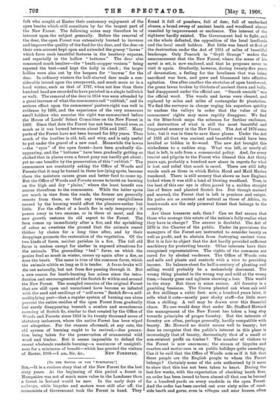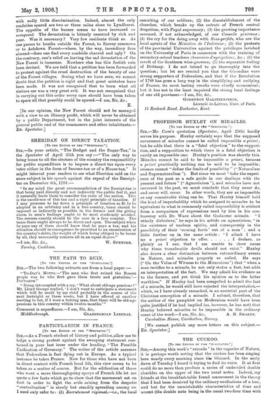To Trls RDITOR OF THIC sescraxott:g
Sin,—It is a curious story that of the New Forest for the last sixty years. At the beginning of this period a forest in Hampshire was not of much more value to the Londoner than a forest in Ireland would be now. In the early days of railways, while bicycles and motors were still afar off, the economist's of Government took the Forest in hand. They found it full of poachers, full of deer; full of unchecked abuses, a broad sweep of ancient heath and Woodland almost unsoiled by improvement or enclosure. The interest of the sightseer hardly existed. The Government had to fight, and on the whole defeated, the opposition of the local landlords and the local small holders. But little was heard at first of the destruction under the Act of 1851 of miles of beautiful landscape. Only Peacock in " Gryll Grange" makes the announcement that the New Forest, where the scene of his novel is set, is now enclosed, and that he proposes never to visit it again. Gradually, however, during twenty-five years of devastation, a feeling for the loveliness that was being sacrificed was born, and grew and blossomed into effective agitation. One after another the stretches of open beechwood, the green lawns broken by thickets of ancient thorn and holly, had disappeared under the official axe. "Smack smooth" was the official word. The woods and lawns were cleared, and replaced by miles and miles of rectangular fir plantation. We find the surveyor in charge urging his superiors quickly to enclose the valleys in order that the -value of the commoners' rights may more rapidly disappear. We find in the Blue-book maps the schemes for further enclosure, and destruction of what is still the most beautiful and frequented scenery in the New Forest. The Aot of 1876 came late; but it was in time to save these places. Under the Act of 1851 all that was ancient and beautiful would have been levelled or hidden in fir-wood. The new Act brought this wickedness to a sudden stop. What was left, or nearly all that is left, is safe from a commercial policy. And, for every tourist and pilgrim to the Forest who blessed this Act thirty years ago, probably a hundred now share in regrets for what is lost and relief that much is saved. There are still lofty woods such as those in which Robin Hood and Maid Marian wandered. There is still scenery that shows us how England looked when it was still a land of blowing woodland. True, in the best of this our eye is often jarred by a sudden straight line of fence and planted Scotch firs. But though maimed and scarred, the Forest that is left is precious and unique. Its paths are as ancient and natural as those of Africa, its beechwoods are the only primeval forest that belongs to the country.
Are these treasures safe, then ? Can we feel secure that those who manage this estate of the nation's fully realise what they have in charge P The answer is doubtful. The Act of 1876 is the Charter of the public. Under its provisions the managers of the Forest are instructed to consider beauty as well as profit, and to abstain from destroying ancient trees. But it is fair to object that the Act hardly provided sufficient machinery for protecting beauty. Other interests have their recognised representatives. The rights of the commons are cared for by elected verderers. The Office of Woods cuts and sells and plants and controls with a view to providing income. Its balance-sheet for half-a-century of planting and selling would probably be a melancholy document. The wrong thing planted in the wrong way and sold at the wrong time,—beauty gone and ugliness showing a loss. This would be the story. But there is some excuse. All forestry is a gambling business. The Crown planted oak when oak sold at five shillings a cubic foot: now, a hundred years later, it sells what it cuts—mostly poor shaky stuff—for little more than a shilling. A veil may be drawn over this financial chaos. No one would deny that under Mr. Stafford Howard the management of the New Forest has taken a long step towards principles of proper forestry. But the interests of forestry are often, perhaps generally, hardly compatible with beauty. Mr. Howard no doubt means well to beauty; but does he recognise that the public's interest in this place is increasingly that of beauty, decreasingly that of a small or non-existent prat on timber? The number of visitors to the Forest is now enormous; the stream of bicycles and coaches and motor-cars is on public holidays quite unending. Can it be said that the office of Woods acts as if it felt that these people are the English people to whom the Forest belongs? Certainly some of the acts authorised by it seem to show that this has not been taken to heart. During the last few weeks, with the expectation of checking heath fires, an order has been issued to burn almost all that can be burned for a hundred yards on every roadside in the open Forest. And the order has been carried out over sixty miles of road- side heath and gorse, even in villages and near -houses, often with 'racily little discrimination. Indeed, almost the only 1.0adsides spared are two or three miles close to Lyndhurst. The appetite of the burner seems to have increased en mangeant. The devastation is bitterly resented by rich and poor. Was it necessary ? -Very few residents think so. As one passes to heaths outside the Forest, to Surrey commons Pr to Ashdown Forest—where, by the way, incendiary fires abound—does one find every roadside charred and ugly ? On the contrary, one's relief on leaving the sad devastation .of the New Forest is immense. Nowhere else has this foolish rule been devised. We are, told that a petition has been forwarded to protest against the cruel destruction of the beauty of one of the Forest villages. Seeing what we have seen, we cannot doubt that the petition is right and that great mistakes have been made. It was not recognised that to burn what all visitors see was a, very great evil. It was not recognised that in carrying out this order every care should have been taken to [Tara all that possibly could be spared.—I am, Sir, &c.,
z.
[In our opinion, the New Forest should not be managed with a view to an illusory profit, which will never be obtained by a public Department, but in the joint interests of the general public and of the commoners and other inhabitants.— ED. • Spectator.]









































 Previous page
Previous page